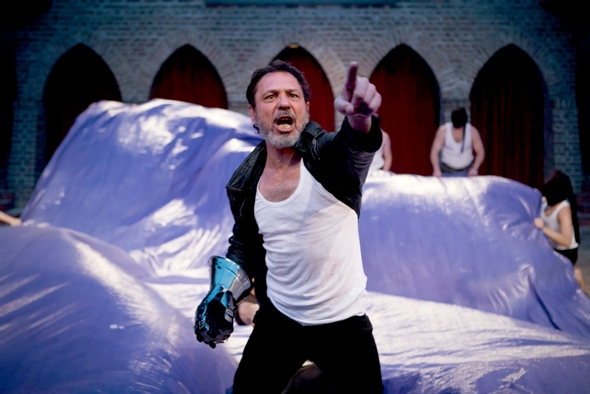‘King Lear’ spun as a parable of oppression when Belarusian troupe goes for dark farce
“King Lear” by Shakespeare, produced by Belarus Free Theatre at Chicago Shakespeare, through Feb. 14. ★★★
By Nancy Malitz
What’s the first image that overtakes you when you think of Shakespeare’s “King Lear”? For me, it’s the broken old man, carrying forth the dead body of his youngest daughter. For some, it’s that first sign of senile dementia, wheedling its way in. And for many, it’s the powerless king, cheering the all-shaking thunderstorm as he howls his impotent rage.
For the Belarus Free Theatre, the sharp and unwavering focus is instead the chaos this king has caused. It’s the insanity and ruin of the wretched state in which his subjects are doomed to live and die. Indeed, there are sufficient lines in Shakespeare’s own words to justify this approach. The company was first invited to offer its riff on “King Lear” for London’s 2012 Cultural Olympiad.
Why did the Belarus Free Theatre choose to see this great tragedy as a dark, apocalyptic farce? Perhaps the answer lies in its formation in 2005 during the repressive regime of Alexander Lukashenko, who promotes himself as a man of the people and is often referred to as бацька (bats’ka or Daddy).
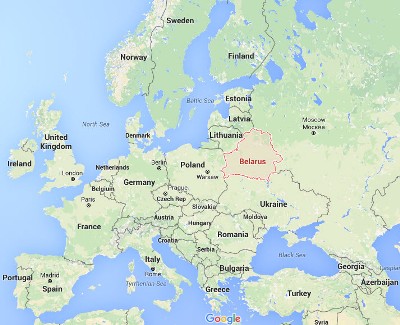 Widely considered to be Europe’s last surviving dictator in a landlocked “republic” at the western edge of Russia and Ukraine, Lukashenko has stepped up the repression, closing newspapers, art galleries and theaters in a manner that echoes Soviet-era policies. The Belarus Free Theatre nevertheless continues to exist — both in exile and underground back at home. The company has been championed by playwrights such as Tom Stoppard and encouraged by London’s theatrical community as well as the Chicago Shakespeare Theater, whose leader, Barbara Gaines, has invited the Belarusians to perform on several occasions, including the Shakespeare 400 Chicago festival currently underway.
Widely considered to be Europe’s last surviving dictator in a landlocked “republic” at the western edge of Russia and Ukraine, Lukashenko has stepped up the repression, closing newspapers, art galleries and theaters in a manner that echoes Soviet-era policies. The Belarus Free Theatre nevertheless continues to exist — both in exile and underground back at home. The company has been championed by playwrights such as Tom Stoppard and encouraged by London’s theatrical community as well as the Chicago Shakespeare Theater, whose leader, Barbara Gaines, has invited the Belarusians to perform on several occasions, including the Shakespeare 400 Chicago festival currently underway.
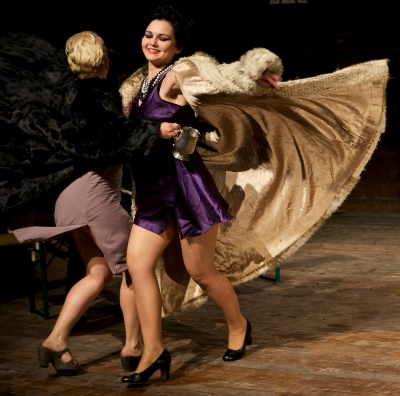 Natalia Kaliada and Nicolai Khalezin, founders of the Minsk-based company, performed without a state license in small pop-up spaces, their colleagues and supporters suffering periodic beatings, apartment raids and job firings. The company has sought in the past to recreate this experience for Londoners by putting them in the mindset of these routinized horrors. Theater goers are told to bring their passports with them to shorten their police stay should they be arrested, and they are given no tickets to create a paper trail. They are instructed by text message where to assemble and then escorted, by the handful, to an undisclosed apartment or abandoned space nearby, where all squeeze together in an experience conjured by threadbare means.
Natalia Kaliada and Nicolai Khalezin, founders of the Minsk-based company, performed without a state license in small pop-up spaces, their colleagues and supporters suffering periodic beatings, apartment raids and job firings. The company has sought in the past to recreate this experience for Londoners by putting them in the mindset of these routinized horrors. Theater goers are told to bring their passports with them to shorten their police stay should they be arrested, and they are given no tickets to create a paper trail. They are instructed by text message where to assemble and then escorted, by the handful, to an undisclosed apartment or abandoned space nearby, where all squeeze together in an experience conjured by threadbare means.
The “Lear” that Belarus Free Theatre unfolds to Chicago audiences is without these pre-arrival experiential elements, although the upstairs theater props evoke the artful bravado of the hopeless and homeless. As directed and designed by Vladimir Shcherban, with adaptation by Nicolai Khalezin, shopping carts and flatbeds are the vehicles of choice. Everyone is either hoarding or on guard. Nourishment is gulped, sniffed, shot into the vein. Peanut butter is an excrement-colored prop component in abundance. And that’s probably apple juice standing in for the other stuff. You are given to believe that beatings are random, and humor is literally forced.
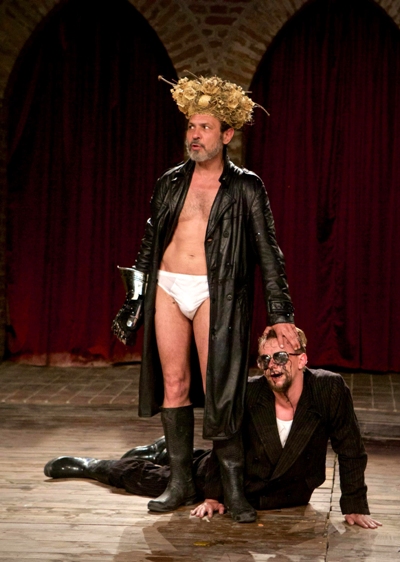 When Lear (the brilliant Aleh Sidorchyk) first shows up, it’s as a practical joking mob boss in a wild disguise. He thinks he’s riotously funny, and when he announces his intention to split his estate three ways among his daughters, provided they profess their love for him, one after the other, in a sort of impromptu contest for his affections, you can sense the assembled throng calculating whether this is going to be one of those go-along to get-along moments — which might end in free booze for everybody — or whether somebody’s going to die.
When Lear (the brilliant Aleh Sidorchyk) first shows up, it’s as a practical joking mob boss in a wild disguise. He thinks he’s riotously funny, and when he announces his intention to split his estate three ways among his daughters, provided they profess their love for him, one after the other, in a sort of impromptu contest for his affections, you can sense the assembled throng calculating whether this is going to be one of those go-along to get-along moments — which might end in free booze for everybody — or whether somebody’s going to die.
The play is performed in Belarusian with English surtitles and it follows the general outline of Shakespeare’s “Lear,” although there are many cuts and the focus never really moves away from the universal absurdity of life for all under this regime. Its general tone is very much in the tradition of the macabre satire favored by novelists, playwrights and composers during the Stalin era, and even earlier in the tsarist 19th century, when bizarre dark comedy was a popular way to let off steam. An excellent example is Shostakovich’s opera “The Nose,” based on a 19th-century story by Gogol, about an official who wakes up one morning to discover that his nose has run away to pursue a life of its own.
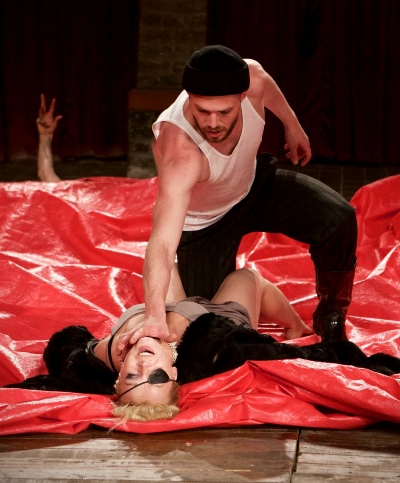 The Belarus Free Theatre does new work almost exclusively. This is not a Chekhov company, nor a Shakespeare company. It is all but impossible to savor the poetry of Shakespeare’s language while reading the surtitles, given the action that’s racing along at the clip these actors take.
The Belarus Free Theatre does new work almost exclusively. This is not a Chekhov company, nor a Shakespeare company. It is all but impossible to savor the poetry of Shakespeare’s language while reading the surtitles, given the action that’s racing along at the clip these actors take.
But it is a very fine ensemble of actors, and there are two scenes in particular that are memorable: In the staging of Lear’s howling into the storm, the entire cast whips a plastic tarp into a fury that threatens, surrounds and engulfs the king in his increasing madness. And toward the end of the play, when Lear and his youngest daughter have been imprisoned, the other “children” of Lear’s misbegotten regime turn murderously competitive, to capture the largest possible share of the tyrant’s spoils.
“Lear” is a long play, and often when it is performed there are trims in this final act, with its obsessive overkill and its sense that even poetry seems to die in the bloody frenzy. But this is where the Belarus Free Theatre finds its truth — even if it freely departs from Shakespeare’s words to do it, a wailing folk-song holding sway..
Related links:
- Performance location, dates and times: Go to TheatreinChicago.com
- Preview of the complete Shakespeare 400 Chicago festival: Read it at ChicagoOntheAisle.com
- Guide to the rest of the Chicago Shakespeare season: Go to ChicagoOnthAisle.com
Tags: Aleh Sicorchyk, Belarus Free Theatre, Chicago Shakespeare Theater, King Lear, Natalia Kaliada, Nicola Khalezin, Shakespeare

